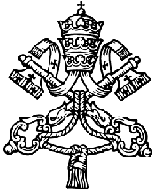June 29: Forging the Papacy
Feast of St. Peter and St. Paul
Foundation of the Papacy
It is on this day, June 29, that the Roman Catholic Church celebrates the feasts of Sts. Peter and Paul. According to tradition outside the church, and required by faith within the church, during the reign of Emperor Nero, Peter was arrested and executed at Rome, although the Church would say he was martyred there. The foundation of the Catholic Church rests on Peter having established the papacy from a historical seat in Ancient Rome. Is this historically true?
The pun in Matthew's gospel about Jesus founding his church with Peter is a late forgery. There was Pope Clement's "Letter of the Church of Rome to the Church of Corinth," which attests to Paul's martyrdom in Rome — not Peter's — and is often taken as Rome's assertion of primacy over all other churches. It is, in fact, only a greeting among equals.
The Gnostic heresy was a hot item while Irenaeus was active (d. 155), but he records no appeal to Rome to settle it. In those days the bishops with large flocks were all called Popes. About the year 190, as ecclesiastical historian Eusebius records it, Pope Victor of Rome ordered the churches of Asia Minor to celebrate Easter at the same time as the Romans. When the bishops of Asia Minor told Victor to sod off, Victor threatened them with excommunication. This prompted reproofs for his arrogance from even Victor's allies.
Tertullian (c. 160-225) wrote disdainfully about Pope Callistus, who presumptively called himself "the supreme pontiff" and "the bishop of bishops." (Callistus, an ex-slave, is listed as a martyr but in fact died in bed.) In 252, Pope Cyprian of Carthage (Africa) clearly discounted the authority of Pope Cornelius to settle ecclesiastical questions. Two years later, some bishops in Gaul appealed to both Rome and Carthage when one of their colleagues was deposed. And when Pope Stephen tried to claim supremacy over the Carthaginian Pope, Cyprian assembled a council and replied tersely, "We judge no man, and we cut off no man from communion for differing from us. None of us regards himself as the bishop of bishops, or seeks by tyrannical threats to compel his colleagues to obey him." Pope Julius tried to give orders to the Eastern bishops in 340. The response was "full of irony and not devoid of serious threats."* Pope Damasus tried again in 382 and the response was equally dismissive.**
It is dishonest to claim that Augustine recognized Roman supremacy when he said a controversy was closed because "Rome has spoken." Augustine was an African bishop himself and believed the two bishoprics to be equals. While the Vandals were sacking the churches in Gaul, Leo I tried once again to assert Roman dominance; Hilary of Gaul replied, says Leo (the Great), in "language which no layman should dare to use and no priest to hear."†
And then the barbarian invasions demolished the churches of Gaul, Spain and Africa (along with the Roman school system and much else), and prompted what was left of the Roman state to become officially Christian. Roman clerics became very wealthy. But they ruled a ruined civilization. When the Empire fell, after 456, there was no organizing structure left but the Roman churches.
In sum, from the time of Peter's fictional martyrdom at Rome until the fall of the Empire, every claim of Roman supremacy over the other churches was rebuffed — and the Eastern Church has never accepted it. Today's papacy was founded on a forgery, sustained by lies, and survives on these holy traditions, including this day's memorial feasts of Sts. Peter and Paul.
*Sozomen (d. 448), Ecclesiastical History, III, 8.
** Theodoret (393-457), Ecclesiastical History, V, 9.
† Leo I (p. 440-461), Epp. x, 3.
Originally published June 2003 by Ronald Bruce Meyer.


